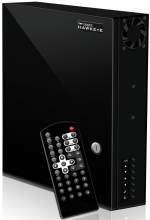Linux DVR catches conspiring clerks
Jan 22, 2009 — by Eric Brown — from the LinuxDevices Archive — 4 views Phillipines-based Neugent Technologies is shipping a compact, multi-channel surveillance DVR (digital video recorder) that can optionally overlay cash register output on surveillance videos. The SP-2000 Hawkeye Desktop DVR runs Linux 2.6.16 on an ARM9 SoC (system-on-chip), supports standalone or network modes, and boasts… hardware MPEG-4 coprocessing.
Phillipines-based Neugent Technologies is shipping a compact, multi-channel surveillance DVR (digital video recorder) that can optionally overlay cash register output on surveillance videos. The SP-2000 Hawkeye Desktop DVR runs Linux 2.6.16 on an ARM9 SoC (system-on-chip), supports standalone or network modes, and boasts… hardware MPEG-4 coprocessing.
(Click for larger view of the SP-2000)
The SP-2000 is aimed at surveillance operations in small to medium-sized buildings, retail areas, commercial spaces, warehouses, banks, and corporate facilities, says the company. Neugent offers three models of the SP-2000, corresponding with the number of channels supported: the SP-2004, SP-2008, and the 16-channel SP-2016.
The SP-2000 is Neugent's second ARM Linux-based DVR, after last summer's release of the almost identical SP-3000 wall-mount version (pictured below). In 2007, the company released the LX8000-series of Linux-based DVRs based on standard PC components. The ARM9-based products are rated as using 35-45 Watts, depending on the number of channels. Though not published, power consumption figures for the PC-based systems (the current model is the LX9000) are likely three- to four-times greater.
Neugent also manufactures DVR video capture cards that ship with Linux development tools. The Pentium 4-based cards use the company's own custom ASIC (application specific integrated circuit) to process video. The ASIC is also likely used in the company's embedded DVRs, which boast hardware MPEG-4 acceleration, it says.
 SP-3000, a wall-mount model that is almost identical to the SP-2000 (Click to enlarge) |
Based on an undisclosed ARM9-based SoC, the SP-2000 offers live MPEG-4 encoding at up to 30fps, along with support for multiple PTZ protocols and sensor/alarm integration, says Neugent. The appliance can hold up to two hard disk drives (HDDs) for a total of 2TB capacity, and provides an Ethernet port, a serial port, and dual USB 2.0 ports used for external backup, says the company. The 11.8 x 9.8 x 2.8-inch box is said to consume between 35 and 45 Watts, depending on the model.
The SP-2000 can simultaneously stream MPEG-4 and JPEG content across across multiple devices, including mobile devices, says the company. Optional integrated POS (point-of-sale/service) text insertion software presumably lets the register readout be overlaid on the video, facilitating comparisons between what customers are charged for, and what they leave with.
Specifications listed for the SP-2000, with differences noted for the SP-2004, SP-2008, and SP-2016 models, are as follows. Note that the specifications for the wall-mount SP-3000 are almost identical, including offering three different models based on number of channels:
- Processor — ARM9-based SoC
- Storage — bays for dual HDD (2 x IDE, or 1 x IDE and 1 x SATA); up to 2TB total
- Networking — 10/100 Ethernet
- USB — 2 x USB 2.0
- Serial — RS232
- PTZ control — RS-485
- Video input — 4-channel (SP-2004), 8-channel (SP-2008), or 16-channel (SP-2016) with DB25 cable; BNC connectors; ITU-R BT, 656; NTSC/PAL
- Video output — 1 x RCA mux; 1 x VGA mux
- Compression — MPEG-4; 2-9 Kb per frame (CIF 360×240); up to 720×480 resolution
- Video features — motion detection, event-triggered
- Audio — 4, 8, or 16 channels DB25 input, shared with video; 1 x RCA input; 1 x channel output; G.723.1 compression
- Sensor inputs — 4 channels (8 channels optional)
- Relay outputs — 2 channels (4 channels optional; 8 channels optional with SP-2016)
- Other features — 1 x 7-button IR remote controller; DDNS support for remote connection
- Power — 100-230 VAC, 50-60Hz
- Power consumption — 35 Watts (SP-2004); 40 Watts (SP-2008); 45 Watts (SP-2016)
- Dimensions — 11.8 x 9.8 x 2.8 inches (30 x 23 x 7cm)
- Weight — 11 lbs (3 kg)
- Operating system — Linux 2.6.16
Availability
The three SP-2000 models and three SP-3000 wall-mount models are available now, with pricing undisclosed, says Neugent. More on the SP-2000 may be found here.
This article was originally published on LinuxDevices.com and has been donated to the open source community by QuinStreet Inc. Please visit LinuxToday.com for up-to-date news and articles about Linux and open source.